The Role of Podcasts in Mental Health Education
Digital Dialogues: Exploring Podcasts as Powerhouses in Mental Health Education


The Role of Podcasts in Mental Health Education
Understanding the Influence of Podcasts on Mental Health Literacy and Support
In an era where digital media dominates how information is consumed, podcasts have emerged as a significant tool in mental health education. Their flexible format, accessibility, and engaging storytelling make them ideal for reaching diverse populations, including underserved and marginalized groups. This article delves into how podcasts are shaping mental health awareness, reducing stigma, fostering empowerment, and their potential to influence health behaviors across different communities.
The Expanding Scope of Mental Health Podcasts
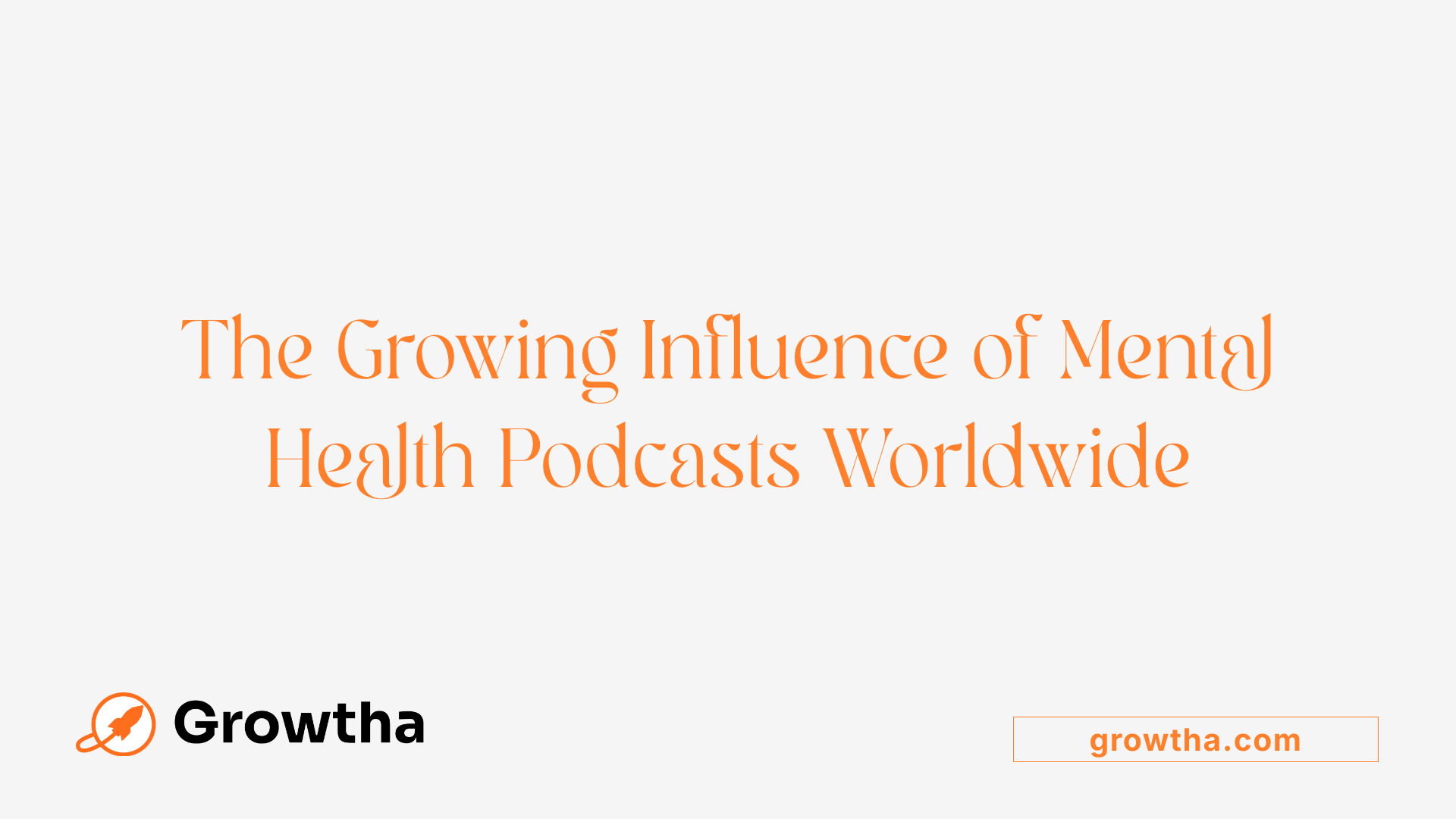
How are mental health podcasts gaining popularity around the world?
Mental health podcasts have seen a remarkable rise in popularity over recent years. With the advent of digital media, podcasts have become a dominant platform for health communication and education. In 2023, there were over 465 million listeners worldwide, with adults dedicating an average of 9 hours weekly to listening. This surge is driven by the on-demand and accessible nature of podcasts, allowing listeners to engage with content conveniently at their own pace.
The proliferation of mental health podcasts coincides with increased public interest in well-being and mental health awareness. Their popularity is further amplified by the ease of sharing episodes through various devices and social media, making it easier for individuals to access vital mental health information. The growth in this medium also reflects broader societal shifts toward destigmatizing mental health issues and encouraging open conversations.
What kinds of topics and audiences do mental health podcasts serve?
Mental health podcasts cover a broad spectrum of topics, including anxiety, depression, mindfulness, therapy techniques, stigma reduction, and personal stories of mental health struggles. They are designed to be relatable and engaging, often incorporating personal narratives alongside evidence-based information.
These podcasts attract diverse audiences. Studies show that participants with lower levels of education and mental health literacy report experiencing the most significant benefits from listening. This makes podcasts an invaluable tool for reaching underserved or marginalized groups, including those with limited access to traditional mental health services.
Listeners appreciate the authentic and personal tone of these podcasts, which humanizes mental health conditions and dispels misconceptions. Moreover, many podcasts are tailored to specific demographic groups, such as students, caregivers, or individuals from particular cultural backgrounds, further broadening their reach.
How do podcasts perform on a global scale regarding listenership and engagement?
Globally, the impact of mental health podcasts is evident through high engagement levels—participation rates often range between 62% and 83%. Most listeners tune in from home or work, demonstrating the flexibility and convenience of this media. This high engagement indicates that podcasts effectively fulfill the need for accessible mental health education.
The international reach of podcasts allows for cross-cultural sharing of mental health experiences and strategies. This global dissemination fosters a sense of community among listeners and helps normalize discussions about mental health worldwide.
Research compiled from multiple studies underscores the importance of quality content and presentation style in maintaining listener trust and satisfaction. Feedback consistently highlights the value of authenticity, personal stories, and medical expertise, making podcasts a trusted source of mental health information.
How is research shaping the future of mental health podcasts?
The increasing volume of research emphasizes the effectiveness of podcasts in mental health promotion and intervention. Multiple studies have demonstrated improvements in mental health literacy, reduction in stigma, and positive shifts in health behaviors following podcast engagement.
Innovative applications of podcasts include targeted interventions such as meditation, mindfulness exercises, and psychoeducational content. These interventions have shown promising results, particularly in stress reduction, mindfulness, and attitudes towards mental illness.
Looking ahead, ongoing studies suggest opportunities for standardizing podcast content and delivery, enhancing production quality, and expanding access through technology, especially for communities facing barriers to traditional treatment.
Let’s review some comparative data to better understand the landscape:
| Aspect | Description | Additional Notes |
|---|---|---|
| Listenership | Over 465 million globally | Increasing annually |
| Average Listening Time | 9 hours/week | High engagement and retention |
| Podcast Topics | Mental health, wellness, medical education | Wide-ranging and inclusive |
| Participant Benefits | Better understanding, reduced stigma, help-seeking | Especially impactful for underserved communities |
| Engagement Rates | 62%-83% participation | Mainly at home and work |
| Intervention Uses | Meditation, psychoeducation, therapeutic talks | Evidence of positive mental health outcomes |
| Target Audiences | Adults, students, caregivers | Emphasis on marginalized groups |
| Popular Platforms | Spotify, Apple Podcasts, Google Podcasts | Accessibility and reach |
| Research Focus | Impact, perceptions, intervention efficacy | Growing body of peer-reviewed evidence |
What does the future hold for mental health podcasts?
As technology advances, the potential for podcasts to serve as effective health promotion tools continues to grow. The emphasis on evidence-based content, combined with user feedback, can improve podcast design and impact.
Endorsement by mental health professionals and public health agencies could enhance credibility and ensure content safety. Additionally, integrating podcasts within broader health strategies, including clinical settings and community outreach, offers promising avenues.
Overall, mental health podcasts are poised to become an integral part of health communication, helping to educate, empower, and destigmatize mental health worldwide. Their accessible, flexible, and scalable nature makes them an essential tool for future health promotion initiatives.
The Impact of Podcast Popularity on Mental Health Education
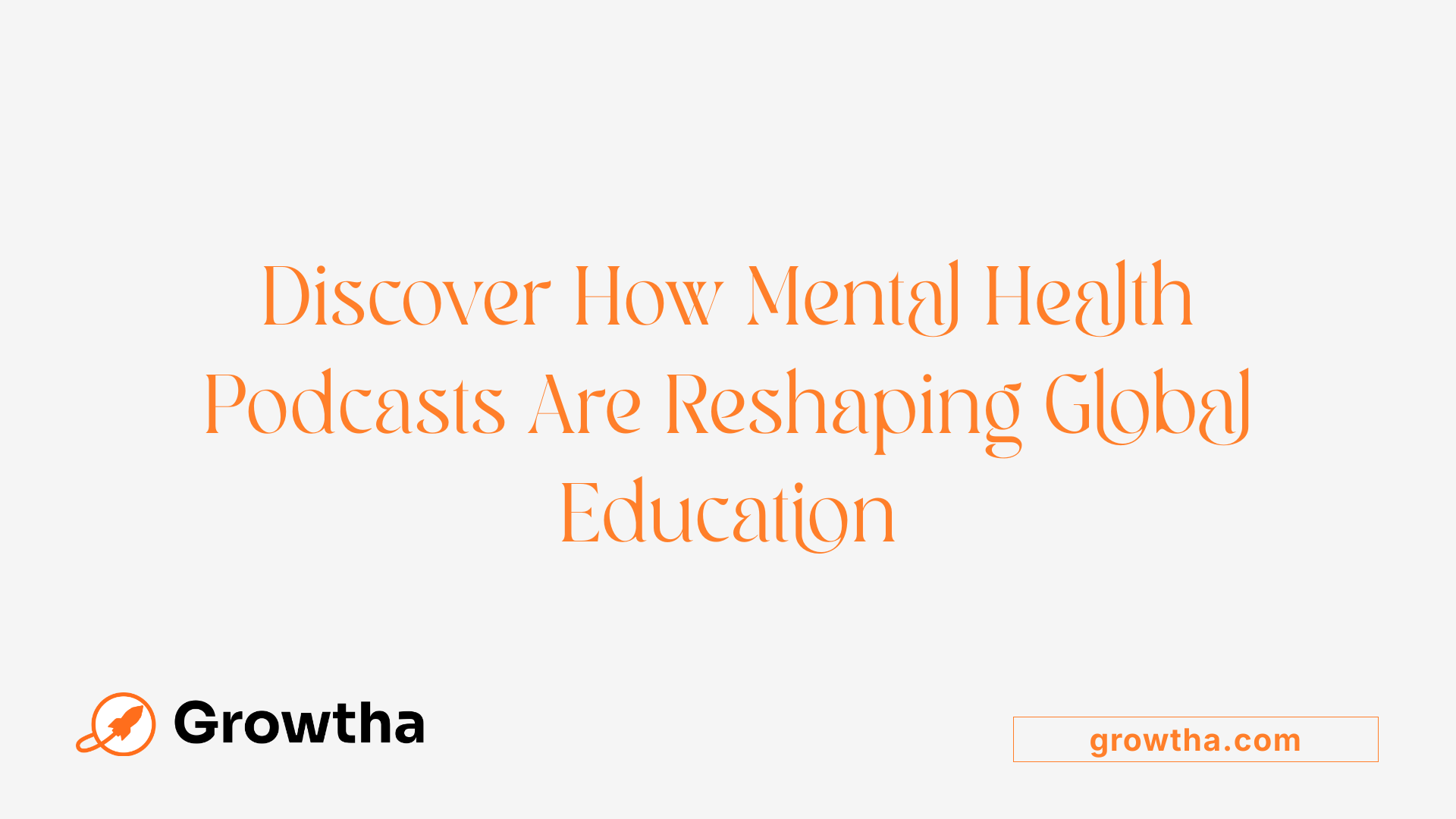
Audiences and listening habits
In 2023, over 465 million people worldwide tuned into health-related podcasts, with a significant number focusing on mental health topics. Listeners often engage with these podcasts during activities like commuting, exercising, or relaxing at home. The typical listener spends about 9 hours per week consuming this content, reflecting strong engagement and sustained interest.
Most audiences prefer podcasts that offer clear, straightforward information. They value content that combines personal stories with accurate medical facts. This blend helps demystify mental health issues, making information accessible and relatable. Engagement is often high, with participation rates ranging from 62% to 83%, indicating that many find these podcasts helpful and trustworthy.
Especially in underserved communities or areas with limited mental health services, podcasts serve as an accessible tool for education and support. They eliminate geographical and financial barriers, reaching diverse populations around the globe.
Listening time and engagement statistics
The high average listening time of 9 hours weekly underscores the importance and popularity of mental health podcasts. This duration suggests that listeners are not only consuming content passively but are actively engaging with topics that resonate deeply with their personal experiences and needs.
The high engagement rates—between 62% and 83% participation—highlight that many listeners find value in these podcasts, often revisiting episodes and sharing content within their social circles. This level of engagement supports the role of podcasts as influential mediums in shaping mental health perceptions and behaviors.
The accessibility of podcasts allows users to listen on multiple devices and at their convenience, fostering ongoing education and normalization of mental health conversations. They can listen while multitasking, making them an efficient and flexible resource.
Perception of podcasts as health communication tools
Listeners generally rate mental health podcasts highly, often comparing them to private therapy sessions in terms of understanding mental health issues. They trust the information presented, especially when it includes expert insights and personal anecdotes.
These podcasts are seen as powerful tools for psychoeducation and destigmatization. They provide expert knowledge in an engaging format, helping normalize mental health struggles and encouraging help-seeking behaviors.
Mental health podcasts also foster community and social connection. Many listeners report feeling less alone and more empowered after engaging with this content. Personal narratives shared in podcasts help develop language around mental health, promote self-reflection, and build empathy.
Professional bodies endorse mental health podcasts as supplementary educational resources. Their widespread use in public health campaigns emphasizes their importance in mental health literacy and stigma reduction.
In summary, the increasing popularity and high engagement levels of mental health podcasts demonstrate their significant role as accessible, trusted, and effective health communication tools. They help bridge gaps in mental health education, support behavioral change, and create a more informed and compassionate society.
Podcasts as Vehicles for Psychoeducation and Health Promotion
What are the benefits of podcasts in mental health promotion and psychoeducation?
Podcasts stand out as an accessible and adaptable platform for mental health education and promotion. Their on-demand nature allows listeners to engage with content at their own pace, making learning more convenient and tailored to individual needs. These programs are especially effective in reaching populations with limited access to traditional mental health services or formal education.
One clear advantage of mental health podcasts is their capacity to boost mental health literacy. They provide straightforward, relatable information through diverse formats such as expert explanations, personal stories, and guided exercises like meditation or mindfulness. This diversity helps demystify complex health topics and makes understanding more approachable.
Research indicates that listening to mental health podcasts leads to meaningful reductions in stigma associated with mental illness. Sharing authentic personal experiences humanizes mental health conditions, fostering empathy and normalizing these issues within society. As a result, listeners often feel less alone and more empowered to seek help when needed.
Furthermore, these podcasts can catalyze positive behaviors. For example, they have been linked with increased help-seeking, better recognition of symptoms, and adoption of coping strategies. They also facilitate self-reflection and language development around mental health topics, helping listeners articulate their feelings and experiences.
Cost-effectiveness is another hallmark of podcasts. They require minimal resources to produce and distribute, making them an economical tool for widespread outreach. Their ease of accessibility across multiple devices allows diverse populations—including those in underserved communities—to benefit from reliable mental health information.
In summary, podcasts serve as powerful tools for mental health promotion and psychoeducation. They enhance knowledge, reduce stigma, encourage help-seeking, and foster community and understanding, ultimately contributing to better mental health outcomes across different societal groups.
Target Populations and Effectiveness for Specific Demographics
What is the influence of podcasts on mental health education for specific populations, such as Generation Z?
Podcasts have become a crucial tool in mental health education, especially among younger populations like Generation Z. Their popularity is driven by accessibility, as most young people are accustomed to consuming digital content through their smartphones and daily devices.
This demographic prefers quick, engaging, and relatable content—qualities that podcasts naturally offer. They align well with Generation Z's preference for flexible, on-demand learning, allowing users to listen during commutes, workouts, or downtime.
Podcasts employ storytelling, personal narratives, and expert insights to foster understanding and normalize mental health issues. This approach helps reduce stigma and encourages open discussions about mental health. For vulnerable groups and individuals with lower education levels, podcasts serve as an accessible entry point to mental health literacy.
Research indicates that listening to mental health podcasts boosts knowledge, encourages help-seeking behavior, and enhances self-awareness among young listeners. Many episodes cover coping strategies, mindfulness, and mental health management in formats appealing to Generation Z.
While initial results are promising, such as increased awareness and reduced stigma, there is a need for further research into the long-term effects and the most effective podcast formats for sustained engagement. Nonetheless, podcasts hold promise as a cost-effective, scalable solution for reaching at-risk and underserved populations.
How do podcasts help underserved communities face barriers to mental health access?
Underserved communities often encounter obstacles like geographic isolation, limited mental health professionals, financial constraints, and societal stigma.
Podcasts break down these barriers by offering free, accessible, and anonymous mental health resources that can be accessed from anywhere with an internet connection. This makes them particularly valuable in rural areas, low-income settings, or regions where mental health stigma discourages seeking help.
Participants in these communities benefit from psychoeducational content, narratives of lived experiences, and practical coping tools shared through podcasts. Such content can empower individuals by increasing their mental health literacy and normalizing seeking help.
Additionally, podcasts can be tailored to cultural contexts, ensuring relevance and sensitivity, which further enhances their utility in diverse communities. The anonymity conveyed by listening privately also reduces fear of judgment.
While challenges like digital divide issues and content quality vary, strategies such as multilingual episodes and partnerships with local organizations can improve effectiveness. Overall, podcasts are a promising supplement to traditional mental health services, addressing gaps where access is limited.
How does storytelling and lived experiences contribute to normalization and empowerment?
Storytelling through podcasts plays a central role in destigmatizing mental health issues. Sharing real personal stories humanizes mental health conditions, making them relatable and understandable.
Listeners hearing peers or respected individuals discuss their struggles and recovery processes foster a sense of connection and reduce feelings of isolation.
This normalization encourages more open conversations and helps individuals recognize their experiences as common rather than exceptional or shameful.
Engagement with authentic narratives can also inspire hope and resilience, motivating listeners to seek help or adopt healthier coping strategies. Moreover, stories from diverse backgrounds promote inclusivity and promote understanding across different communities.
Empowerment arises as listeners gain language and confidence to articulate their mental health needs, ask questions, and participate actively in their wellness journey. The practice of sharing stories fosters community support and creates a sense of belonging, which is vital for psychological well-being.
In summary, storytelling on podcasts not only educates but also builds a more compassionate and informed mental health landscape, especially for those who feel marginalized or misunderstood.
| Population Focus | Key Benefits | Challenges | Examples |
|---|---|---|---|
| Generation Z and Youth | Engaging, relatable content, supports self-help and help-seeking | Ensuring content relevance, maintaining engagement | 'The Mind Deconstructed Podcast' targeting psychiatry topics |
| Underserved Communities | Accessibility, anonymity, cultural relevance | Digital divide, low digital literacy | Community-specific episodes, multilingual content |
| Lived Experience and Storytelling | Normalization, empowerment, reduced stigma | Maintaining authenticity, managing privacy | Personal stories shared by mental health advocates |
This overview underscores the importance of tailored podcast content in reaching diverse populations and promoting mental health literacy effectively.
Reducing Stigma and Promoting Mental Health Advocacy
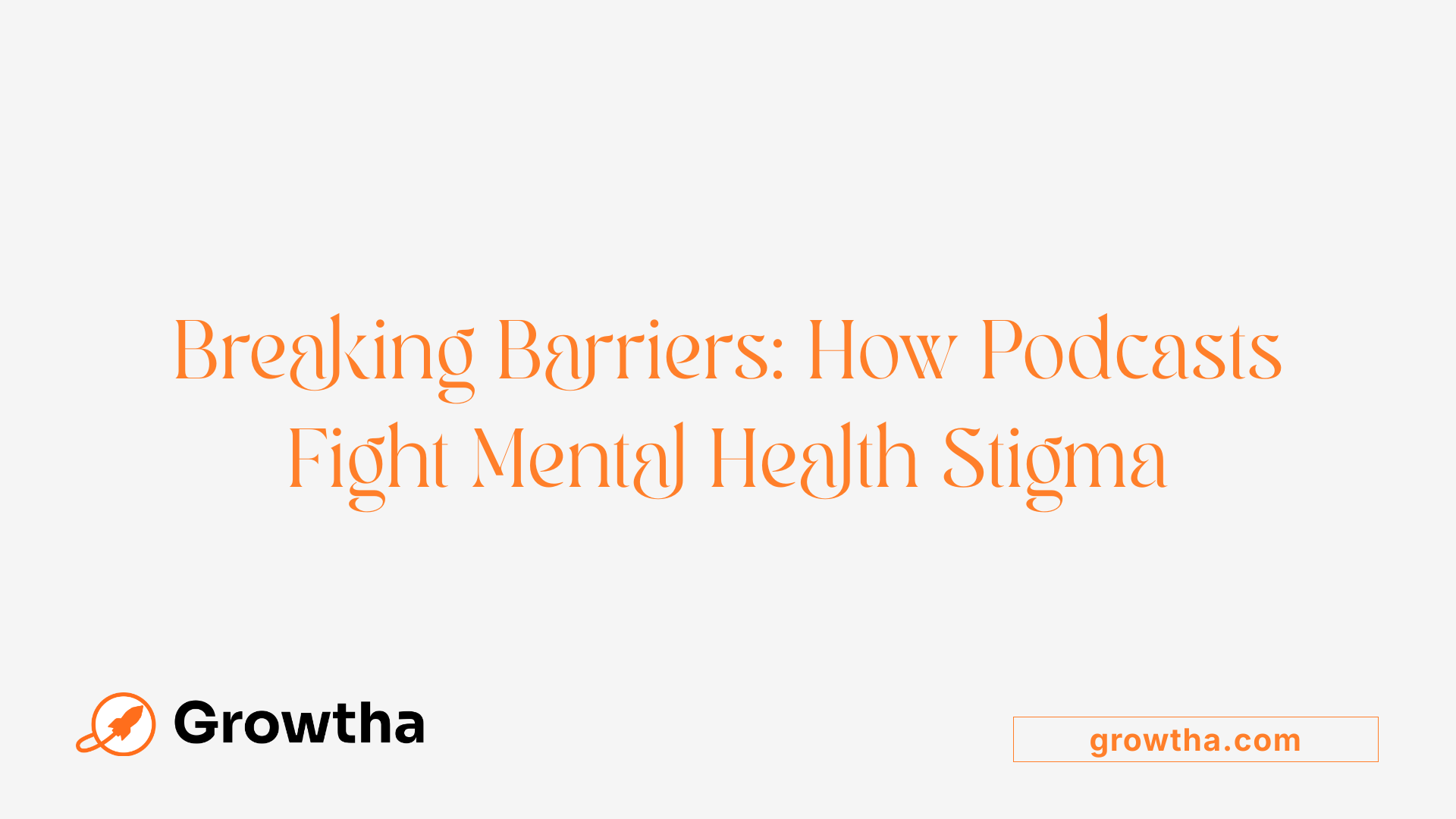
How do podcasts help reduce stigma and promote mental health advocacy?
Podcasts serve as influential platforms for decreasing mental health stigma by humanizing the experiences of individuals with mental health conditions. Sharing personal stories and recovery journeys allows listeners to see mental health challenges through a more relatable and compassionate lens.
One effective approach showcased in podcasts like the National Alliance on Mental Illness (NAMI) episode "Hope Starts With Us" involves featuring individuals with lived mental health experiences, alongside experts who provide context and insights. These narratives challenge common stereotypes, dispelling myths and misconceptions that often reinforce societal prejudices.
Research indicates that hearing authentic stories fosters empathy and understanding, creating social contact that significantly reduces stigma. Unlike traditional educational campaigns, storytelling in podcasts offers intimacy and emotional engagement, making the information more memorable and impactful. This method encourages listeners to see mental health issues not as distant or taboo topics, but as human experiences that can be shared openly.
Furthermore, podcasts contribute to normalization by fostering open dialogues around mental health. They make discussions more accessible, which helps reduce fear and silence surrounding these topics. As a result, individuals may feel more comfortable seeking help and talking about mental health issues in their own circles.
Community engagement is also enhanced through podcasts, as they can mobilize listeners to participate in advocacy efforts, support others, and promote cultural shifts toward acceptance. Overall, podcasts act as powerful advocacy tools by increasing awareness, reducing stigma, and encouraging a more inclusive view of mental health in society.
Podcasts as Tools for Support and Empowerment
How can podcasts contribute to mental health empowerment and support?
Podcasts have become a powerful medium for mental health education, outreach, and personal empowerment. They offer accessible and credible information on a broad range of mental health topics, including trauma, well-being, recovery, and stress management.
One of their notable strengths is fostering a sense of community and shared experience. Many listeners report feeling less alone after engaging with mental health podcasts, as these platforms often feature personal stories and honest conversations. These stories serve to humanize mental health conditions, reduce stigma, and encourage open dialogue.
Specialized podcasts like "Breaking Down Mental Health" or "What Parents Are Saying" are tailored to both the general public and specific groups such as caregivers. They offer practical guidance on managing challenges, navigating mental health services, and understanding complex issues like neurodiversity or substance use.
Expert insights, scientifically backed information, and therapeutic techniques are often incorporated into podcast content. These elements make podcasts an invaluable complement to professional mental health treatment, providing ongoing support outside clinical settings.
Furthermore, podcasts contribute to normalizing discussions about mental health. They empower individuals by increasing awareness and knowledge, which can motivate help-seeking behaviors. Listeners learn coping strategies, self-compassion techniques, and self-management skills that they can apply in their daily lives.
Overall, mental health podcasts not only educate but also inspire and motivate listeners to take proactive steps towards their well-being. They serve as a bridge between professional care and everyday self-help, enabling more people to gain control over their mental health journey and fostering resilience within communities.
Health Promotion, Destigmatization, and Psychoeducation Strategies via Podcasts
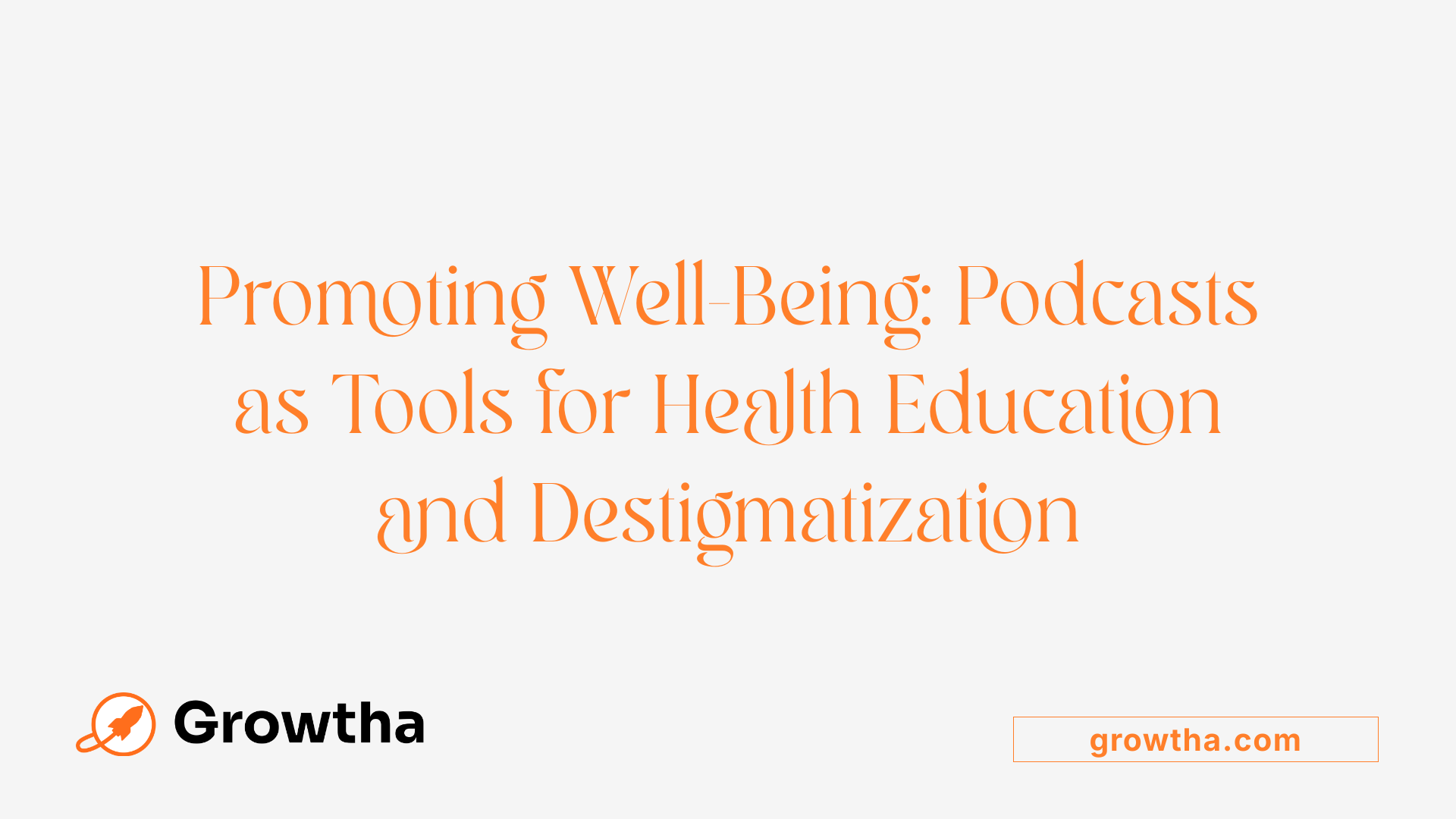
How do podcasts serve as tools for health promotion, destigmatization, and psychoeducation?
Podcasts are emerging as versatile platforms for promoting health and well-being, particularly in mental health. They offer easily accessible, engaging, and relatable content that can reach diverse audiences worldwide. This makes them especially effective for health promotion initiatives aimed at raising awareness and increasing knowledge about mental health issues.
One of their primary roles is normalizing mental health concerns. By sharing personal stories, expert insights, and real-life experiences, podcasts help challenge societal stigmas and misconceptions that often hinder individuals from seeking help. For example, mental health podcasts frequently include testimonies from individuals who have experienced mental health struggles, humanizing these issues and fostering a more accepting environment.
Moreover, podcasts facilitate psychoeducation by delivering educational content in an informal, digestible format. They can explain complex health topics, provide coping strategies, and discuss intervention options, making mental health information more accessible to the general public. This is particularly valuable in communities where access to formal mental health services is limited.
Engagement and behavioral change are critical aspects of health promotion. Podcasts incorporate storytelling, expert opinions, and interactive features that enhance listener engagement and information retention. This encourages listeners to reflect on their own behaviors and consider making positive health changes.
While several studies highlight the positive potential of podcasts in increasing mental health literacy and reducing stigma, their impact on actual health behaviors varies. Some listeners report adopting healthier routines or seeking support after engaging with health podcasts.
Nonetheless, the efficacy of podcasts for broad health promotion relies heavily on content quality, presentation style, and audience relevance. Well-designed, evidence-based podcasts are more likely to foster trust, motivate action, and sustain behavioral change.
In summary, podcasts can be powerful tools for health promotion and destigmatization, especially when they combine engaging storytelling with accurate, evidence-based information. Ongoing research and strategic content development are essential to maximize their impact in fostering healthier communities.
Effectiveness of Podcasts for Special Populations and Long-term Outcomes
How do podcasts influence mental health education for specific groups, like Generation Z?
Podcasts have become a vital resource for reaching targeted populations, especially Generation Z, who are digital natives and favor on-demand, audio-based content. Their accessibility and convenience make them ideal for delivering mental health education tailored to young people's communication preferences.
Generation Z often faces stigma around mental health; podcasts offer a safe space to learn and explore mental health issues through stories and expert insights. They promote understanding and normalize mental health conditions by sharing personal narratives, reducing feelings of isolation.
Research suggests that podcasts can improve mental health literacy and help-seeking behaviors, particularly among vulnerable groups and those with lower educational backgrounds. These audiences often benefit most from relatable content and authentic storytelling, which fosters empathy and self-awareness.
However, while initial studies show promising short-term improvements in knowledge and attitudes, there is limited data on the long-term effects of podcast-based interventions. The sustainability of behavior change, ongoing engagement, and lasting attitude shifts require further investigation.
Overall, podcasts serve as a cost-effective, engaging method for mental health education among specific populations like Generation Z. They effectively complement traditional approaches but need more development, standardized guidelines, and longitudinal research to maximize their impact.
Challenges and Future Directions in Podcasts for Mental Health Education
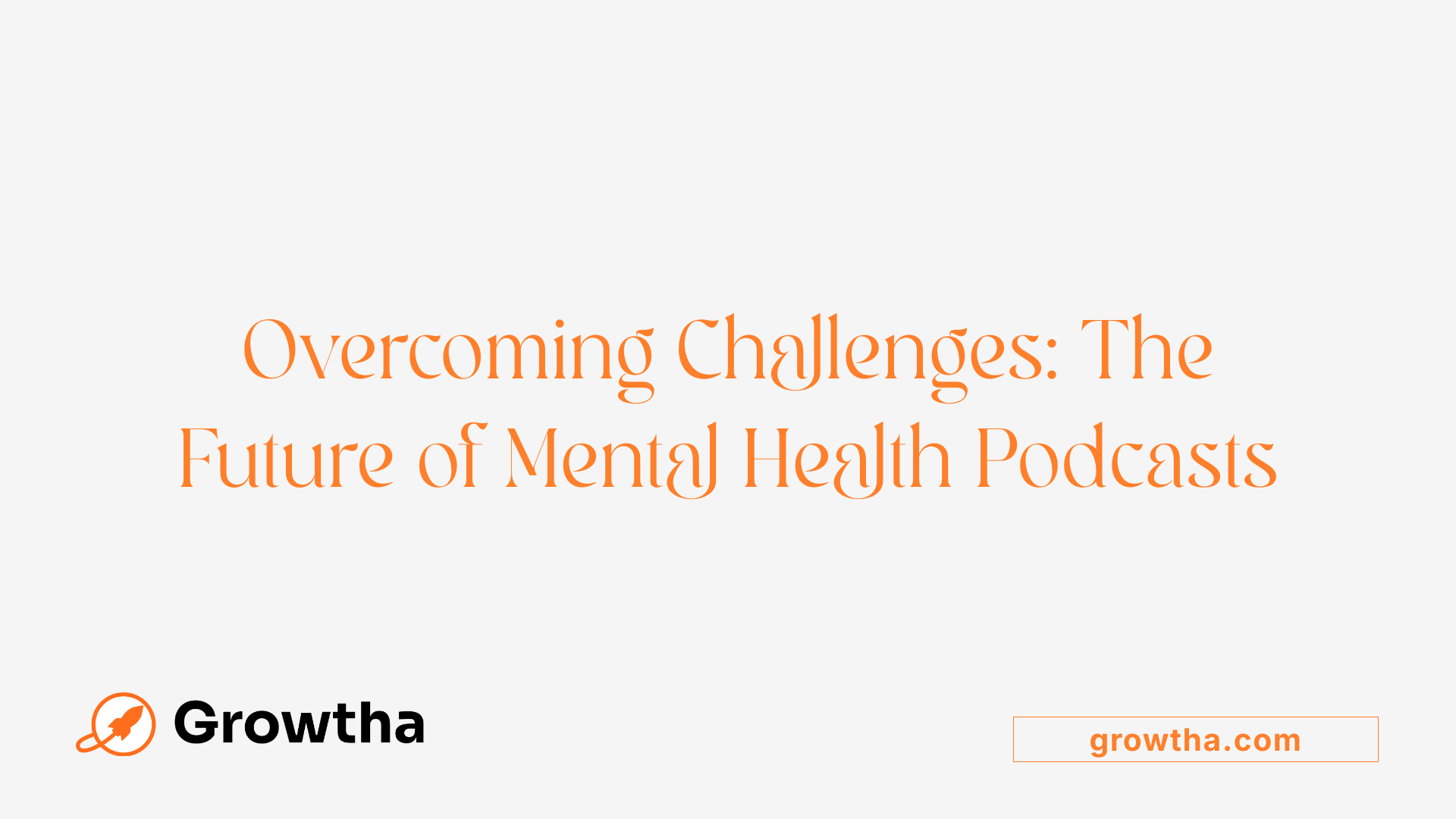
How does variability in content quality affect the use of mental health podcasts?
One of the major concerns with using podcasts for mental health education is the inconsistency in content quality. Many podcasts are produced without standardized guidelines, leading to disparities in accuracy, depth, and engagement. Some episodes may provide evidence-based information, while others lack scientific backing, which can potentially misinform listeners.
The variability can undermine trust and reduce the effectiveness of podcasts as educational tools. It makes it difficult for listeners to discern credible sources from less reliable ones. To address this issue, listeners are encouraged to critically evaluate podcasts based on the expertise of hosts, references used, and consistency with established mental health guidelines.
Standardizing content quality can also help ensure that the information delivered is both accurate and accessible, which is essential for fostering well-informed listeners and promoting effective mental health advocacy.
Podcasts as Platforms for Professional Development and Public Education
Use of Podcasts in Healthcare Professional Training
Podcasts are increasingly being integrated into the education and ongoing professional development of healthcare providers. Many health professionals use podcasts to stay updated with the latest research, clinical guidelines, and best practices in mental health care. This digital format allows for flexible, on-the-go learning, fitting into busy schedules.
Educational podcasts cover numerous topics, including recent advances in psychiatry, innovative therapeutic techniques, and case studies. They serve as supplementary tools that enhance understanding and facilitate discussion among healthcare teams.
Examples include specialist-led podcasts that provide deep dives into complex issues, which can be particularly helpful for practitioners seeking continuous learning opportunities outside traditional classroom settings.
Endorsement by Professional Bodies
Endorsing mental health podcasts by professional and regulatory bodies can help ensure content safety and maintain high standards of information accuracy. Recognition by organizations such as the American Psychiatric Association or mental health councils underscores the credibility of podcast content.
Endorsements facilitate public trust and encourage healthcare providers to recommend quality podcasts confidently. They also promote responsible content creation, emphasizing evidence-based practices and ethical considerations.
Quality Assurance and Content Safety
Standardized guidelines for designing and reporting podcast-based health interventions are urgently needed. These guidelines should cover content accuracy, theoretical grounding, and engagement strategies to ensure effectiveness.
Quality assurance involves peer review processes, clear citation of sources, and transparency about authorship and potential conflicts of interest. Furthermore, technical quality, such as sound clarity and presentation style, influences listener engagement and trust.
In terms of safety, content should be appropriately tailored for target audiences, avoiding misinformation and ensuring accessibility. Regular evaluations and feedback collection can help maintain high standards and adapt content to emerging needs.
Supporting Evidence from Research
Research supports the positive role of podcasts in mental health education and intervention. Studies have shown that podcasts can increase mental health literacy, foster help-seeking behaviors, and reduce societal stigma. They are accessible, convenient, and can reach underserved communities.
Many scholarly articles highlight that podcasts serve as effective psychoeducational tools, especially when content includes personal stories, expert insights, and clear, succinct information. Moreover, their use in professional development is growing, emphasizing the importance of quality control and standardization.
| Aspect | Details | Additional Notes |
|---|---|---|
| Usage in Training | Used by health professionals for continuous education | Enhances knowledge and skills |
| Endorsements | Supported by professional bodies | Ensures credibility and safety |
| Quality Standards | Need for standardized guidelines | Includes content accuracy, engagement |
| Challenges | Variability in quality, digital access disparities | Ongoing evaluation needed |
| Impact | Improves literacy, reduces stigma, supports behavior change | Evidence mostly positive |
Overall, podcasts hold substantial promise as tools for both professional and public mental health education, provided their content is well-designed, validated, and ethically produced.
The Future of Podcasts in Mental Health Education and Advocacy
What is the influence of podcasts on mental health education for specific populations, such as Generation Z?
Podcasts have a significant role in shaping mental health understanding among specific groups like Generation Z. Their influence stems from the format’s accessibility and alignment with the preferences of younger audiences. Generation Z prefers on-demand, multimedia learning, and podcasts provide a convenient way to access information anytime and anywhere.
These audio programs effectively promote mental health literacy by incorporating storytelling, personal narratives, and mindfulness exercises. This approach helps reduce stigma and foster a more accepting attitude towards mental health issues.
For vulnerable groups and those with limited educational backgrounds, podcasts can serve as an essential tool for increasing understanding and normalizing mental health conditions. They provide psychoeducational content that resonates through authentic stories and expert insights, making complex topics easier to grasp.
Despite promising outcomes like improved knowledge, help-seeking behaviors, and destigmatization, current research indicates a need for more comprehensive studies to evaluate their long-term impact. It’s also important to develop best practices for content creation, ensuring that the information remains accurate and engaging.
Overall, podcasts are emerging as a low-cost, accessible, and engaging means of mental health education. They uniquely reach Generation Z, offering an effective supplement or alternative to traditional educational methods, especially for those who are less likely to seek help through conventional channels.
Harnessing the Power of Digital Media for Mental Health Innovation
As mental health awareness continues to growGlobally, podcasts remain a vital, accessible, and dynamic platform for education, support, and advocacy. Their ability to reach wide audiences, foster empathy, normalize conversations, and provide credible information makes them invaluable in the evolving landscape of mental health care. Future developments and research should focus on standardization, quality assurance, innovative content formats, and integrating podcasts into broader health systems and policies to maximize their impact and ensure equitable access for all.
References
- Podcasts as a tool for enhancing mental health literacy
- Podcasts as a tool for promoting health-related behaviours
- The impact of podcast-based interventions on mental health
- Podcasts in Mental, Physical, or Combined Health Interventions for ...
- listeners' experiences of mental-health-related podcasts
- The Impact of Podcasts on Mental Health: A Tool to Break Stigma ...
- Listening to mental health podcasts reduces stigma
- Using Mental Health Podcasts for Public Education
- Exploring the impact, challenges, and integration of podcasts in ...
- [PDF] The Importance of Self-Development Podcasts to Improving Mental ...







